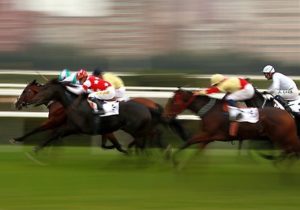What’s the purpose of a stewards’ enquiry?
 A stewards’ enquiry may be called for a variety of reasons, not all of which, necessarily, may have affected the result of the race in question. The purpose of a stewards’ enquiry is to ensure that all races are run fairly, in accordance with the Rules of Racing. A panel of stewards investigates any possible breach(es) of the rules and, having heard evidence from jockeys, trainers, stable staff and other interested parties, makes a joint decision on what action to take, if any. In most cases, a stewards’ enquiry is completed, and its outcome is announced to the public, before the start of the next race.
A stewards’ enquiry may be called for a variety of reasons, not all of which, necessarily, may have affected the result of the race in question. The purpose of a stewards’ enquiry is to ensure that all races are run fairly, in accordance with the Rules of Racing. A panel of stewards investigates any possible breach(es) of the rules and, having heard evidence from jockeys, trainers, stable staff and other interested parties, makes a joint decision on what action to take, if any. In most cases, a stewards’ enquiry is completed, and its outcome is announced to the public, before the start of the next race.
Possible infractions include ‘improper’ or ‘careless’ riding, which may have resulted in deliberate or accidental interference and ‘schooling in public’, where a jockey fails, in the eyes of the stewards, to make a ‘timely, real and substantial effort to obtain the best possible placing’. If the stewards decide that the rules have been broken, they have the power to revise the placings in a race, impose fines and suspensions on jockeys and trainers and, if necessary, refer incidents to the disciplinary committee of the British Horseracing Authority (BHA) for further action at a late date.